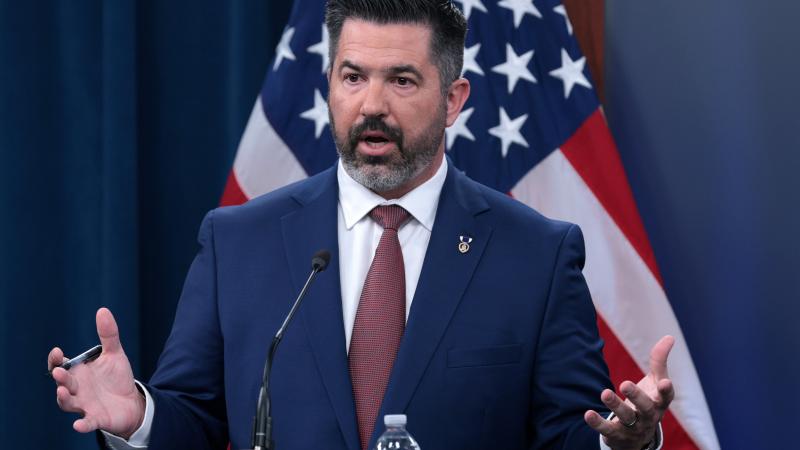FBI ramps up warnings against election interference from abroad
The latest FBI warning comes less than two weeks after Russian President Vladimir Putin offered to "reboot" digital security relations between his country and the U.S., to include a mutual non-interference pact regarding one another's elections.
The Federal Bureau of Investigation is ramping up efforts to warn the American public that foreign agents may try to threaten the upcoming national elections.
"Election Day 2020 is four weeks away, and the FBI is charged with protecting the rights of all Americans, including their right to vote," the FBI's spokesman Michael Paul, who leads the Minneapolis Field Office, said Monday in a statement. "From now until November third, every American has a role to play in protecting the election from threats against the democratic process."
This latest FBI warning comes less than two weeks after Russian President Vladimir Putin offered to "reboot" digital security relations between his country and the United States, to include a mutual non-interference pact regarding one another's elections.
"One of today's major strategic challenges is the risk of a large-scale confrontation in the digital field," Putin said Sept. 25 in a statement that appeared in English on his official website. "A special responsibility for its prevention lies on the key players in the field of ensuring international information security (IIS). In this regard, we would like to once again address the U.S. with a suggestion to agree on a comprehensive program of practical measures to reboot our relations in the field of security in the use of information and communication technologies (ICTs)."
Without directly acknowledging that Russia has attempted to hack U.S. electoral systems, nor accusing the United States of the same, Putin proposed a mutual "no-first-strike" policy with "guarantees of non-intervention into internal affairs of each other, including into electoral processes, inter alia, by means of the ICTs and high-tech methods."
The FBI, nevertheless, reiterated warnings that previously included Russia among the foreign elements that try to illegally influence the American political process. Others in that category are China, and unspecified foreign-aligned groups. And, the bureau cautioned, the methods of attack go beyond what Putin described as ICTs.
The Bureau warned against a combination of cyberattacks, disinformation, and other methods intended to influence or cast doubt on the election, or to provoke conflict.
"These attacks might include foreign adversaries hacking and leaking sensitive information from computers, databases, networks, phones, and emails," the FBI wrote. Or, the onslaught could take the form of false information meant to inflame discord.
"Potential election threats range from foreign influence and cyber operations to campaign finance crimes, voter or ballot fraud, and civil rights violations," said Martin Culbreth, who runs the Bureau's Norfolk, Va. field office. "Foreign adversaries pose a significant threat to election integrity through their attempts to polarize the public or suppress voters by spreading false information on social media."
Last week, the FBI along with the Cybersecurity and Infrastructure Security Agency (CISA) warned in particular against foreign-backed online journals that are designed to spread false information.
"Foreign intelligence services have been known to use websites, including pseudo-academic online journals, to disseminate articles with misleading or unsubstantiated information," the organizations wrote in an Oct. 1 joint statement. "Such sites could be employed during the 2020 election season in an attempt to manipulate public opinion, increase societal divisions, cause widespread confusion, discredit the electoral process, and undermine confidence in U.S. democratic institutions."
The bureau encouraged citizens with information about election crime or voter fraud to contact their local FBI field office.
"Across the country, the FBI has initiated public awareness messaging about election security online at fbi.gov and across our social media platforms," Paul said.














